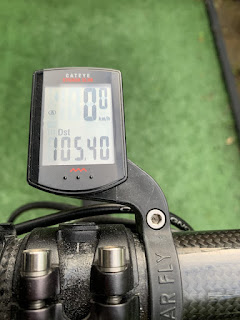 |
| This was in Oct 2018 |
 |
| 105 km before work |
Evidence regarding this has been mixed. Some studies show that prolonged and strenuous exercise tends to blunt one's appetite, sometimes for hours or even into the next day. Other studies suggest the opposite, finding that some people feel hungrier after workouts of any kind and quickly eat the calories they expended and continue to eat more at the next meal.
Consider the following study. Participants in this weight loss study did not feel like eating after running or strength training. The physical activity prevented them from overeating. But it was not the strenuous exercise that blunted their appetites.
In that study, 130 participants (between 18 to 70) were asked to exercise for one year. Other than light physical activity, the fitness program also had moderate to vigorous physical activities of up to 250 minutes a week. Each of them wore a fitness tracker and was given a daily calorie goal based on their body mass index (BMI).
Results showed that when the participants did not exercise, they were 12 percent more likely to overeat (or exceed their daily calorie goal). However, when the participants exercised for 60 mins, their risk of overeating was lessened to 5 percent. For every extra 10 minutes of exercise after 60 minutes, the chances the participants would overeat dropped by a further 1 percent.
To my surprise and the surprise of the researchers, light physical activity (walking at a slow leisurely pace) showed the strongest effects against overeating compared to moderate (brisk walk) to vigorous physical activity (running or strenuous fitness class).
The researchers explained that exercise causes peptide YY, a hormone which suppresses appetite to spike, while causing grehlin (which stimulates appetite) to drop. This led to the participants not feeling hungry after exercise.
Another possible reason is that exercise boosts mood and self esteem, which may improve one's motivation not to overeat.
Also note that participants in the study had participants with BMI values between 27 to 50 (overweight or obese) and they were looking to lose weight. What they perceived as moderate physical activities may be different to what you and I may perceive.
For most of us, exercise can affect our hunger and weight in unexpected and contradictory ways. So during this holiday season, do not worry that if you exercise you will overeat. A short period of indulgence should not affect your weight in the long term if you exercise regularly .
Reference
Crochiere RJ, Kerrigan SG, Lampe EW et al (2020). Is Physical Activity A Risk Or A protective Factor For Subsequent Dietary Lapses Among Behavioral Weight Loss Participants? Health Pysch 39(3): 240-244. DOI: 10.1037/hea0000839.




No comments:
Post a Comment